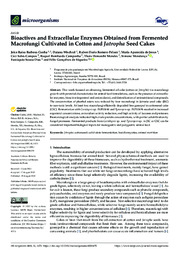Bioactives and extracellular enzymes obtained from fermented macrofungi cultivated in cotton and Jatropha seed cakes.
Bioactives and extracellular enzymes obtained from fermented macrofungi cultivated in cotton and Jatropha seed cakes.
Author(s): CUNHA, J. R. B.; WISCHRAL, D.; PELAEZ, R. D. R.; JESUS, M. A. de; SALES-CAMPOS, C.; CAMPANHA, R. B.; MENDES, T. D.; MENDONCA, S.; DIAS, E. S.; SIQUEIRA, F. G. de
Summary: This work focused on obtaining fermented oil cake (cotton or Jatropha) via macrofungi growth with potential characteristics for animal feed formulations, such as the presence of extracellular enzymes, bioactive (ergosterol and antioxidants), and detoxification of antinutritional compounds. The concentration of phorbol esters was reduced by four macrofungi in Jatropha seed cake (JSC) to non-toxic levels. At least two macrofungi efficiently degraded free gossypol in cottonseed cake (CSC). Fermentation with Coriolopsis sp. INPA1646 and Tyromyces sp. INPA1696 resulted in increased ergosterol concentrations, antioxidant activity reduction, and high activity of laccases and proteases. Bromatological analysis indicated high crude protein concentrations, with partial solubilization by fungal proteases. Fermented products from Coriolopsis sp. and Tyromyces sp. in JSC or CSC can be considered important biological inputs for monogastric and polygastric animal feed.
Publication year: 2022
Types of publication: Journal article
Unit: Embrapa Agroenergy
Observation
Some of Embrapa's publications are published as ePub files. To read them, use or download one of the following free software options to your computer or mobile device. Android: Google Play Books; IOS: iBooks; Windows and Linux: Calibre.
Access other publications
Access the Agricultural Research Database (BDPA) to consult Embrapa's full library collection and records.
Visit Embrapa Bookstore to purchase books and other publications sold by Embrapa.

